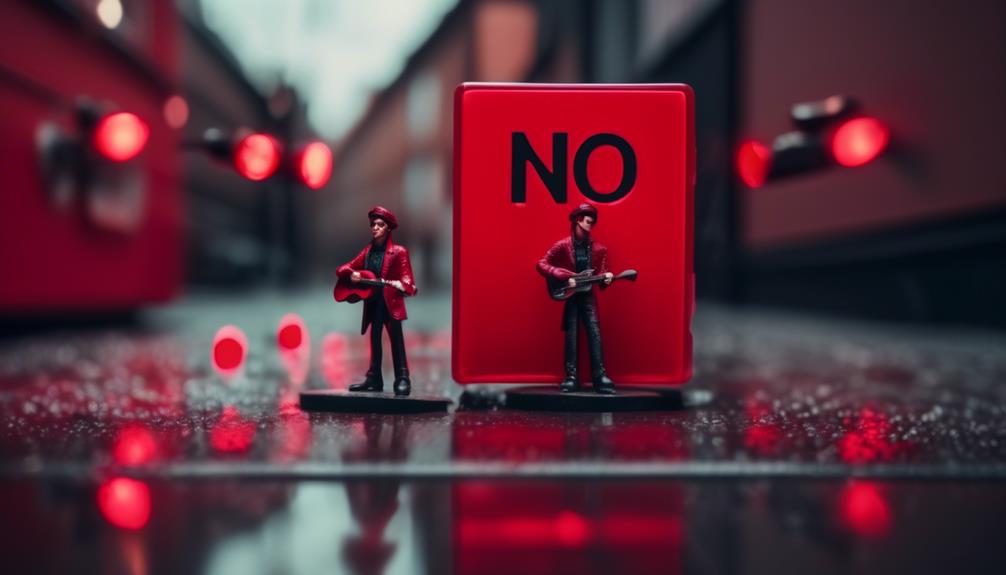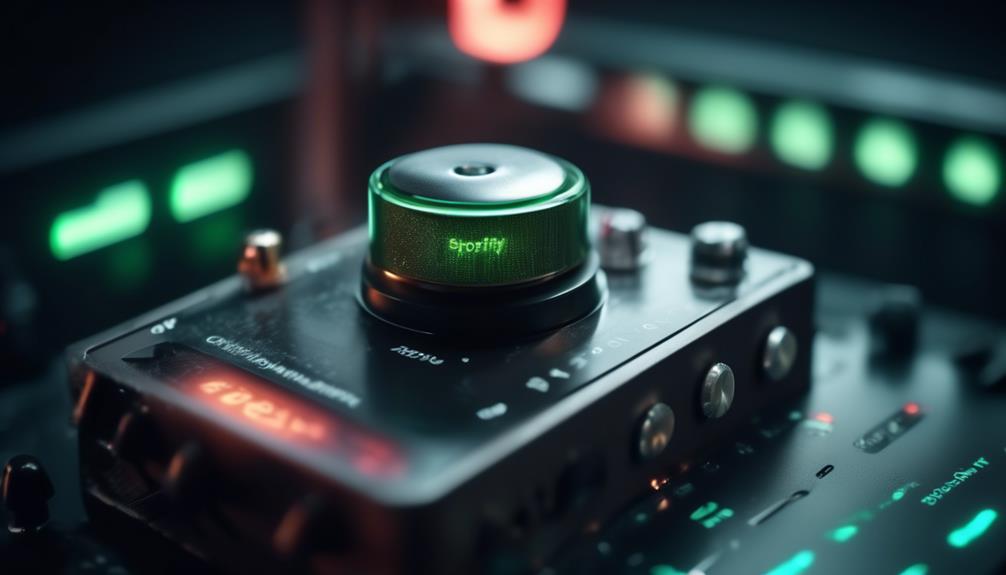
What is not allowed on Spotify?
Just as a gourmet chef wouldn’t tolerate low-quality ingredients in their kitchen, Spotify, a leading global music streaming platform, has a stringent set of rules that it abides by to ensure a high-quality user experience.
You might think Spotify is a free-for-all, but in reality, there’s a lot that isn’t allowed on the platform.
From unlicensed music content to hate speech in playlists, misleading artist information, inappropriate playlist images, and more, Spotify takes its regulations seriously.
With so many aspects to consider, isn’t it intriguing to know more about what can lead to a violation of Spotify’s policies?
Let’s navigate through these uncharted waters together.
Key Takeaways
- Unlicensed music content is strictly prohibited on Spotify to uphold copyright laws and protect artists‘ creative rights.
- Spotify takes a firm stand against hate speech and has stringent policies and mechanisms in place to monitor, detect, and remove hate content.
- Misleading artist information compromises the platform’s integrity, and Spotify implements a verification process to ensure authenticity and penalizes fake profiles.
- Spotify has consequences for copyright violations, offensive user profiles, spam, manipulative behavior, artificial stream boosting, and illicit song sampling, including warnings, suspensions, and permanent account removals.
Unlicensed Music Content

Often, you’ll find that unlicensed music content is strictly prohibited on Spotify. This platform puts a great deal of emphasis on upholding copyright laws to prevent copyright violations and piracy issues. You see, when you upload unlicensed music, you’re stepping over legal boundaries that protect artists and their creative rights.
If you’re an innovator exploring new ways to share music, it’s vital to understand that Spotify isn’t a platform for piracy. It’s designed to be a space where creators can share their work legally and listeners can access their favorite tunes under fair use. That’s why Spotify takes a firm stance against unlicensed content.
The implications of copyright violations are significant and can result in legal consequences for the violator. So, you’d better make sure that all your ducks are in a row when it comes to licensing. If you’ve got brilliant music to share, ensure you obtain the necessary rights or permissions first. This way, you’ll avoid piracy issues, respect creators’ rights, and maintain an innovative, lawful presence on Spotify.
It’s all about understanding the rules of the game and playing fair.
Hate Speech in Playlists
You should be aware that Spotify takes a firm stand against hate speech in its playlists. They’ve established monitoring and reporting mechanisms to ensure this policy is enforced.
It’s important to understand these aspects as part of Spotify’s commitment to creating a safe and positive listening environment.
Spotify’s Stand Against Hatred
Spotify tackles hate speech in its playlists by implementing a stringent policy on hate content control. They have identified four key actions in this regard.
- Vigilance: Spotify is constantly on the lookout for content promoting hatred or violence.
- User Reporting: Spotify encourages users to report anything they perceive as hate content.
- Partnership with Rights Advocates: Spotify collaborates with groups fighting against hate speech to ensure their platform remains safe and inclusive.
- Algorithmic Checks: Spotify’s technology helps detect and remove hate content.
Spotify’s stand against hatred emphasizes their commitment to maintaining a positive listening environment. Their innovative approach serves as a model for other platforms aiming to control hate content.
Monitoring and Reporting Mechanism
To ensure a hate-free platform, Spotify has implemented a rigorous monitoring and reporting mechanism to identify and eliminate hate speech in playlists. You might have privacy concerns about this, but Spotify balances user surveillance with the need to maintain a respectful environment.
Here’s how it works:
| Step | Process | Privacy Protection |
|---|---|---|
| 1 | Spotify’s algorithms scan playlists for hate speech. | Your data is anonymized and used solely for this purpose. |
| 2 | If suspicious content is identified, it’s reviewed by a team of experts. | This team only sees the content in question, not your personal data. |
| 3 | If validated as hate speech, the content is removed. | You’ll be notified, but your identity remains confidential to other users. |
This way, Spotify ensures hate-free music while respecting your privacy.
Misleading Artist Information

Now, let’s turn your attention to the issue of misleading artist information on Spotify.
This can involve fake artist profiles and manipulation of stream counts.
Understanding these practices is crucial because they can compromise the integrity of the platform and the authenticity of the music you listen to.
Fake Artist Profiles
A significant issue on Spotify is the proliferation of fake artist profiles, which present misleading information to users. This not only undermines the profile verification process but also has serious impersonation consequences.
To combat this, Spotify:
- Implements a stringent artist verification process.
- Penalizes users who create fake profiles.
- Regularly purges identified fake profiles.
- Empowers artists and listeners to report suspicious profiles.
It’s essential you’re aware of these safeguards to ensure your streaming experience remains authentic and enjoyable. Remember, Spotify’s commitment to innovation goes hand in hand with maintaining a reliable and trustworthy platform.
Now, with this knowledge, you can be proactive in spotting and reporting any false artist profiles you come across.
Manipulating Stream Counts
While fake artist profiles can be a nuisance, there’s another troubling practice on Spotify you should watch out for: the manipulation of stream counts, which can lead to misleading artist information.
This act not only compromises the integrity of the platform but also deceives users regarding an artist’s popularity.
Stream fraud detection is crucial to preserving the authenticity of Spotify’s data. The platform uses sophisticated algorithms to identify suspicious streaming activities, efficiently detecting and penalizing those who artificially inflate stream counts.
These culprits face copyright infringement penalties, which serve as a deterrent.
It’s essential to be aware of these practices, promoting a fair and innovative music streaming experience for all users.
Inappropriate Playlist Images
In curating your playlists, it’s crucial to remember that Spotify prohibits the use of inappropriate images. This is a part of Spotify’s image censorship policy aimed at maintaining the playlist decorum. It’s not just about the music, the visuals matter too.
Here’s what you need to keep in mind:
- Explicit Content: Avoid images with explicit, offensive or violent content. This includes nudity, graphic violence, or anything that incites hate or discrimination.
- Copyrighted Material: Using copyrighted images without permission can lead to your playlist being taken down, or even your account getting suspended.
- Irrelevant Images: The image should be relevant to the playlist content. Misleading images result in a poor user experience and may be removed.
- Personal Information: Don’t use images that display personal information, yours or anyone else’s. It’s not safe and it’s against Spotify’s policies.
In the age of visual storytelling, the right playlist image can amplify your playlist’s impact. But remember, the image must adhere to Spotify’s guidelines. Breaking them can lead to penalties. So, while adding that creative touch to your playlists, ensure the image you use respects these guidelines.
Duplicate Artist Profiles

Navigating the world of Spotify as an artist, it’s essential that you don’t create duplicate profiles, which can confuse listeners and dilute your music’s impact. Spotify’s guidelines strictly prohibit the creation of duplicate artist profiles. This is to foster a robust, credible, and user-friendly music ecosystem where each artist’s unique voice is recognized and respected.
Creating duplicate profiles can lead to artist impersonation, causing a significant breach of trust within the Spotify community and creating legal issues. It’s crucial to avoid this at all costs. Instead, you should focus on maintaining a single, authentic profile that accurately represents your brand and music.
Profile verification on Spotify is a powerful tool that establishes your identity, gains listener trust, and boosts your visibility. Verified profiles are marked with a blue check, signaling authenticity and credibility. To avoid confusion and ensure your listeners are directed to the correct profile, you need to apply for profile verification.
Let’s turn our attention to unauthorized remixes on Spotify.
You may not realize it, but uploading these can lead to serious consequences.
In the next section, we’ll clarify what constitutes an unauthorized remix and discuss the repercussions of breaching this rule.
Understanding unauthorized remixes on Spotify is crucial, as these are essentially remixes of original songs made without explicit permission from the original artist or copyright holder. These can pose challenges in terms of remix copyrights and remix monetization.
- Remix Copyrights: These are legal rights that protect the original composition. Unauthorized remixes infringe these rights, leading to legal issues.
- Remix Monetization: Unauthorized remixes can’t legally generate revenue. If you’re caught, you’ll face penalties.
- Original Artist Rights: Unauthorized remixes violate the rights of the original artist, who deserves recognition and compensation.
- Spotify’s Stand: Spotify is against unauthorized remixes. Any such content found is swiftly removed to maintain a fair platform.
Consequences of Violation
Regularly violating copyright laws through unauthorized remixes on Spotify can lead to severe consequences. Depending on the penalty severity, you may face a temporary or permanent user suspension.
| Violation | Penalty Severity | Consequences |
|---|---|---|
| First Violation | Low | Warning and education about Spotify’s policies |
| Second Violation | Medium | Temporary User Suspension |
| Third Violation | High | Permanent User Suspension |
Offensive User Profiles

Spotify strictly prohibits user profiles that promote hate speech, discrimination, or any form of offensive content. This policy is a testament to Spotify’s commitment to creating an inclusive platform that respects the rights, dignity, and diversity of all users.
Profile impersonation and offensive usernames are particular areas of concern. If you engage in either of these practices, you’re crossing the line. Here’s a brief rundown of the rules in these areas:
- Profile Impersonation: You aren’t allowed to impersonate other individuals or entities. Using someone else’s photo, name, or personal information without their consent is strictly forbidden.
- Offensive Usernames: Usernames that are offensive, abusive, or hateful aren’t tolerated. This includes, but isn’t limited to, usernames that are racist, sexist, or homophobic.
- Inappropriate Profile Pictures: Any images that are offensive, explicit, or inappropriate aren’t permitted.
- Hate Speech: Your profile shouldn’t promote or endorse hate speech, violence, or discrimination.
Spam or Manipulative Behavior
Navigating the vast ocean of music on Spotify should be a pleasure, not a chore cluttered with spam or marred by manipulative behavior. Your experience is paramount, hence, Spotify relentlessly refines its spam detection techniques to combat any disruptive elements. They’re continuously evolving, keeping a step ahead of miscreants who might otherwise ruin your sonic journey.
Part of this involves user education. You’re encouraged to understand what constitutes spam or manipulative behavior. It’s not just about unwanted messages or fake followers. It can also be playlist manipulation, where users artificially inflate the play counts of certain songs. Or, it could be deceptive practices, like misleading metadata that leads you to the wrong artist or track.
Artificial Stream Boosting

While understanding the intricacies of spam and manipulative behavior is crucial, it’s equally important to be aware of another disruptive practice: artificial stream boosting. This is a tactic where streams are inflated artificially to create a false impression of popularity.
Boosting detection methods: Spotify uses advanced algorithms and machine learning to detect and remove artificial streams. This safeguard ensures fairness and authenticity in the platform’s ecosystem.
Impacts on artists: Artificial stream boosting can harm artists’ reputation and credibility. It also distorts fair competition and undermines the genuine efforts of other artists.
Penalties: Those found guilty of artificial stream boosting may face penalties such as removal of tracks, reduction of streams, or even suspension of accounts.
Community responsibility: It’s essential for you, as a user, to report any suspicious activities to help maintain Spotify’s integrity.
Artificial stream boosting isn’t only unfair to artists, but also detrimental to the innovative and authentic experience Spotify strives to offer. So, stay informed, stay vigilant, and let’s ensure a fair and thriving music community on Spotify.
Illicit Song Sampling
In the realm of music, illicit song sampling poses another significant issue you need to be aware of. This practice involves utilizing a portion of another artist’s work without obtaining the requisite permissions or licensing. It’s not just an ethical concern; it directly breaches the sampling legality and carries serious copyright implications.
Spotify, as a leading music streaming platform, is committed to maintaining a fair and legal environment for all creators. Therefore, any song found to contain unlicensed samples is promptly removed from the platform. Furthermore, artists found guilty of this practice risk permanent disqualification from Spotify’s services.
Why is this important for you as an artist or a listener? Infringing on another’s copyright not only disrespects their creative efforts but can also lead to legal repercussions. If you’re an artist, always ensure to obtain all necessary permissions before sampling another’s work.
For listeners, supporting artists who respect these rules helps maintain an innovative, vibrant music industry.

